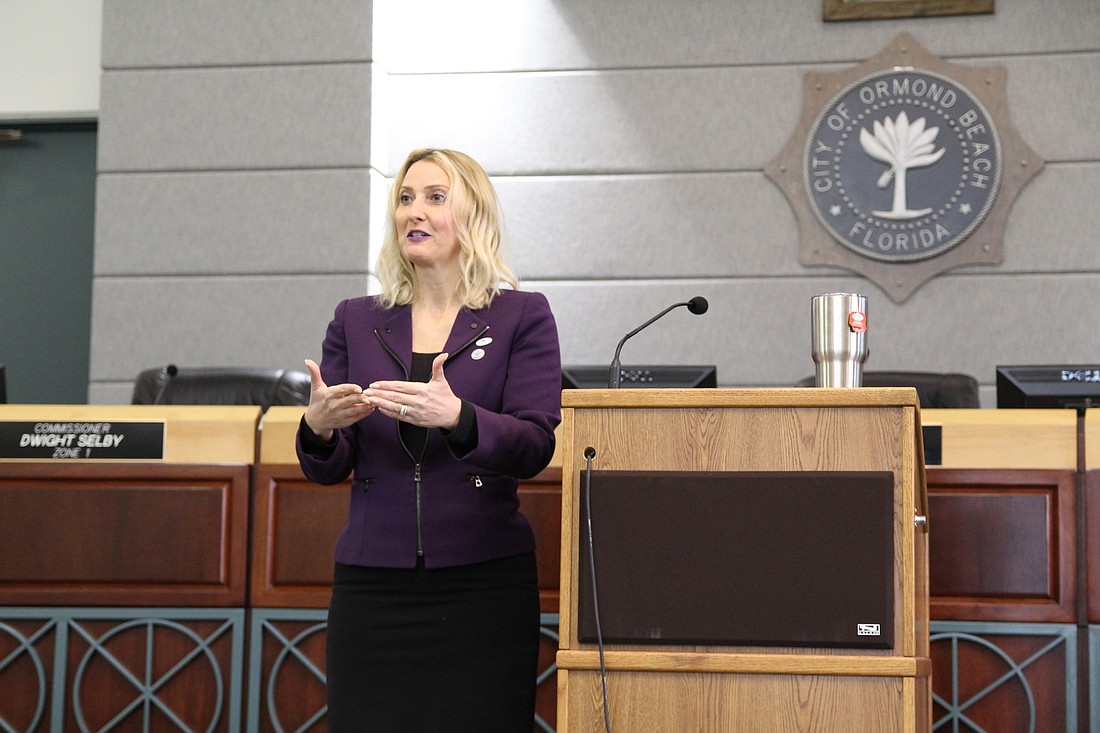- April 25, 2024
-
-
Loading

Loading

The Volusia County Council was once again at odds over EMS after Councilwoman Heather Post presented data that showed examples of emergency response times of more than 30 minutes in a six-day period.
On Aug. 8, it took an ambulance 36 minutes to reach a stroke victim in Ormond Beach, Post said at the council meeting on Tuesday, Sept. 18. In the comments of that specific call, "delay for distance" was listed, since the ambulance was coming from DeLand. This was one of the few examples from the data Post revealed, which detailed ambulance response times longer than 20 minutes from Aug. 2-8.
Volusia County EMS Medical Director Peter Springer said these calls were outliers. Earlier in the meeting he had stated that the county's average response time, calculated from the time ambulances were dispatched and not from the time calls came in, was seven minutes and 30 seconds and that the county's average was "better than the whole state's average."
When presented with the alarming data, Springer responded with a question.
“Do we know if there were any bad outcomes from that?” Springer said.
Post said she was horrified by his statement, and Springer apologized but said that was part of the business.
Before this conversation took place, Springer had explained that the county is currently working on separating emergency and non-emergency calls and that a new algorithm system will be introduced in mid-October to help with this. He said that the two approved Basic Life Support ambulances will help to transport non-emergency patients, which have been accounted for the majority of the EMS call volume. County Council Chair Ed Kelley had asked him to come speak before the council on the issue, though Kelley was absent from the meeting due to sickness.
He also said the county is looking into allowing EMS to give out taxi vouchers in case crew arrives on scene and it is determined the call is of a non-emergency nature. Another method the county is considering is creating a waiver that will allow an EMS crew to free themselves when dealing with a non-emergency call, should they be needed elsewhere.
They can do better, Springer said, but it all depends on what they want to do. If they want to improve response times, Springer said they could add more personnel, though he would like to wait until they implement the other suggested methods.
County Councilwoman Heather Post said that Springer was at a recent meeting she had with the director of EMS, where it was discussed more staff was needed — specifically, the addition of 16 people.
“I’m confused as to how we’re going from that to ‘everything is fine,'" Post said.
“If we’re comfortable with what we have and make some tweaks to higher acuity calls, then it’s possible we could do with what we’ve got," Springer said.
Post said that Springer was at a recent meeting she had with the director of EMS, where it was discussed more staff was needed — specifically, the addition of 16 people.
“I’m confused as to how we’re going from that to ‘everything is fine,'" Post said.
When asked to clarify that point by Councilman Fred Lowry, Springer said he believes the number was thrown out as a suggestion but that there was "no science" behind it. Lowry said it was once again "reckless" of Post to read those response times.
“I think it’s painting a wrong picture, would you agree with that?” Lowry asked Springer, who responded, "To a point."
Councilwoman Deb Denys apologized to Springer for the "blame game," and after calling order on the council, she told the story of her husband's accident in 2000. She said the first responders to the scene were from the Edgewater Fire Department.
“Do you think I asked what the dispatch time was?" Denys said. "I never once asked that question. Do you think I cared what patch it was or who was wearing it when they responded?"
"I know this," Denys said. "The system worked.”
In 2000, the county had yet to take over EVAC.
Post said that this conversation wasn't a "blame game" but needed dialogue to fix an issue. Several other members of the council rushed her through the conversation and asked her not to delve into details as she read off more response times.
“Those are concerning calls for us, when we hear numbers like that," Interim County Manager George Recktenwald said.
He said they'll have to look at overall data to upgrade the county's system so times like that never happen. A workshop on the issue will happen in November, Recktenwald added.
This story was updated at 9:06 p.m. to reflect that the data collected by Post was from a six-day period, not six-weeks.